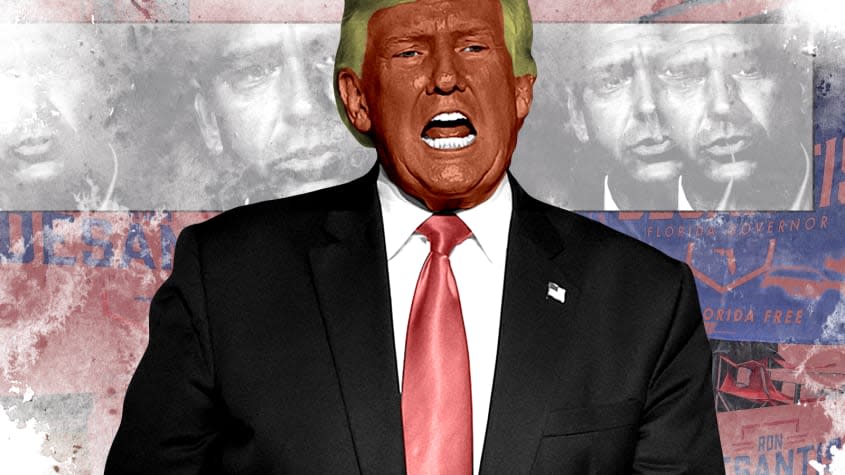Will Trump regret picking on Ron DeSantis?

- Oops!Something went wrong.Please try again later.
- Oops!Something went wrong.Please try again later.
Former President Donald Trump made some last-minute campaign appearances to help fellow Republicans rally voters ahead of the Tuesday midterm elections. But Trump's biggest headlines came from his ridiculing of a fellow Republican, Florida Gov. Ron DeSantis. Speaking at a Saturday rally for GOP Senate nominee Mehmet Oz, who was polling neck-and-neck with Democrat John Fetterman, Trump referred to DeSantis as "Ron DeSanctimonious." The next day, Trump urged Floridians to vote for DeSantis in a rally for Sen. Marco Rubio (R-Fla.) in Miami-Dade County. But DeSantis wasn't even invited to the event.
Conservative pundits piled on, criticizing Trump for dividing Republicans right before Election Day, and for coming up with such a "dumb nickname," as conservative writer Matt Walsh called it. "What an idiot," tweeted Rod Dreher, a senior editor for The American Conservative. "DeSantis is a far more effective leader of the Right than Trump was, if, that is, you expect a leader to get a lot done, rather than just talking about it and owning the libs." DeSantis has courted the GOP base with hardline stands for tighter borders and against "woke" politics, fueling speculation he might run for the White House in 2024. Did Trump score points ahead of a possible primary battle, or was his attack on DeSantis a bad idea?
Trump's DeSantis attack was an unforced error
"Trump's attack was a mistake," says David Strom at Hot Air, and not just because he chose to do it "just before an election day" when Republicans were determined to "destroy the Democrats." It did remind everyone that Trump didn't really back DeSantis, who didn't need Trump's backing to win re-election against Democratic former Rep. Charlie Crist. The fact that the former president's insult was "electorally irrelevant" "shows Trump to be weaker than he wants to look against a political rival." He looks like a heckler, not a kingmaker.
But the real reason Trump's insult was a "big unforced error" is that it invites people to compare him to DeSantis, who is "an extraordinary politician." Specifically, Trump's jab "opened up an old wound that could be Trump's Achilles' Heel: his huge mistakes dealing with COVID," including his decision to hand over the coronavirus response to Anthony Fauci and Deborah Birx, caving to the "COVID-industrial complex" on lockdowns and other key policies, while DeSantis was among the first governors to commit to reopening his state as quickly as possible.
This will blow over. The question is, what next?
Trump "created a bit of drama," says Gary Fineout in Politico, but "this public display" of long-simmering tension between him and the governor of what is now his home state won't do much damage in the short run. In fact, on Sunday Trump and DeSantis both held rallies in Florida, with Trump offering his "kind-of, sort-of endorsement" of DeSantis, telling Floridians they were going to re-elect their governor.
The question now is when Trump will take his next "swipe at DeSantis." Several news outlets have reported that Trump plans to announce his run for the 2024 Republican presidential nomination shortly after the midterms. "A DeSantis candidacy is unlikely to move ahead until some time in 2023." The "Ron DeSanctimonious" line was one of Trump's "most direct shots yet" and could show he intends to get an early jump on his leading likely rival for the GOP nomination for president.
Trump's self-centeredness strikes again
Ron DeSantis is doing fine without Trump's support, but Mehmet Oz sure could have used it, says The Wall Street Journal in an editorial. Trump was supposed to be boosting Oz in his tight race against Fetterman, but all anyone remembers is his trolling of DeSantis. "As usual with Mr. Trump, the rally turned out to be less for Mr. Oz than for ... himself." Trump boasted he's "winning big, big, big" in the early 2024 GOP primary polls, with him at 71 percent and "Ron DeSantimonious at 10 percent." Trump also mocked Mike Pence, noting that his former vice president and future potential primary rival is at 7 percent, adding, "oh, Mike's doing better than I thought."
Trump wants to lead the GOP again in 2024, and he knows that DeSantis is his biggest likely rival. "But his focus on his own prospects, and criticizing his fellow Republicans even before a crucial midterm election, is one more reminder that Mr. Trump's only abiding principle is what's good for Donald Trump."
If "DeSanctimonious" is the best Trump can do, he's in trouble
Trump used to be good at insults, says Margaret Hartmann at New York magazine's Intelligencer. In fact, he used his "talent for bestowing nasty nicknames" to smack down his rivals in 2016 and win the White House. His greatest hits, "'Lyin',' 'Liddle,' 'Crooked,' and 'Rocket Man' had nothing to do with the subject's actual name." These days he is clearly off his game, tossing out unfunny "headscratchers," like "Mitch 'Broken Old Crow' McConnell, and Elaine 'Coco' Chao."
Trump settled on "Ron DeSanctimonious" after DeSantis' wife, Casey, "tweeted a laughably over-the-top video that suggests the governor was literally sent by God" to do, you know, what Ron DeSantis does — "bully teens, harass migrants, and protect children from life-saving vaccines." Why sanctimonious? Why not "DeSpised, DeSpicable ... DeSpotic." Trump has to do better than this. "If we have to live in a world where our political future is determined, in part, by one semi-fascist Florida Man's ability to effectively insult another semi-fascist Florida Man, the least they can do is give us some truly inspired and amusing insults."
You may also like
Russian uproar over reported mass troop casualties in disastrous battle gets rare official response
TV pundits, election analysts declare Trump 'the biggest loser' of the 2022 midterms

